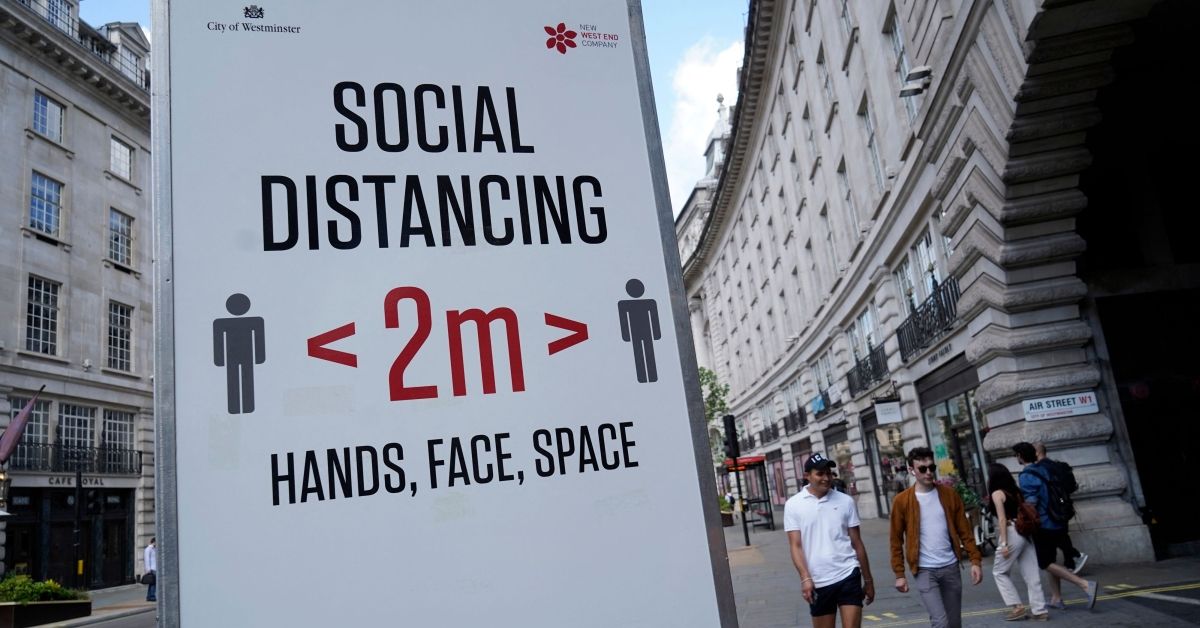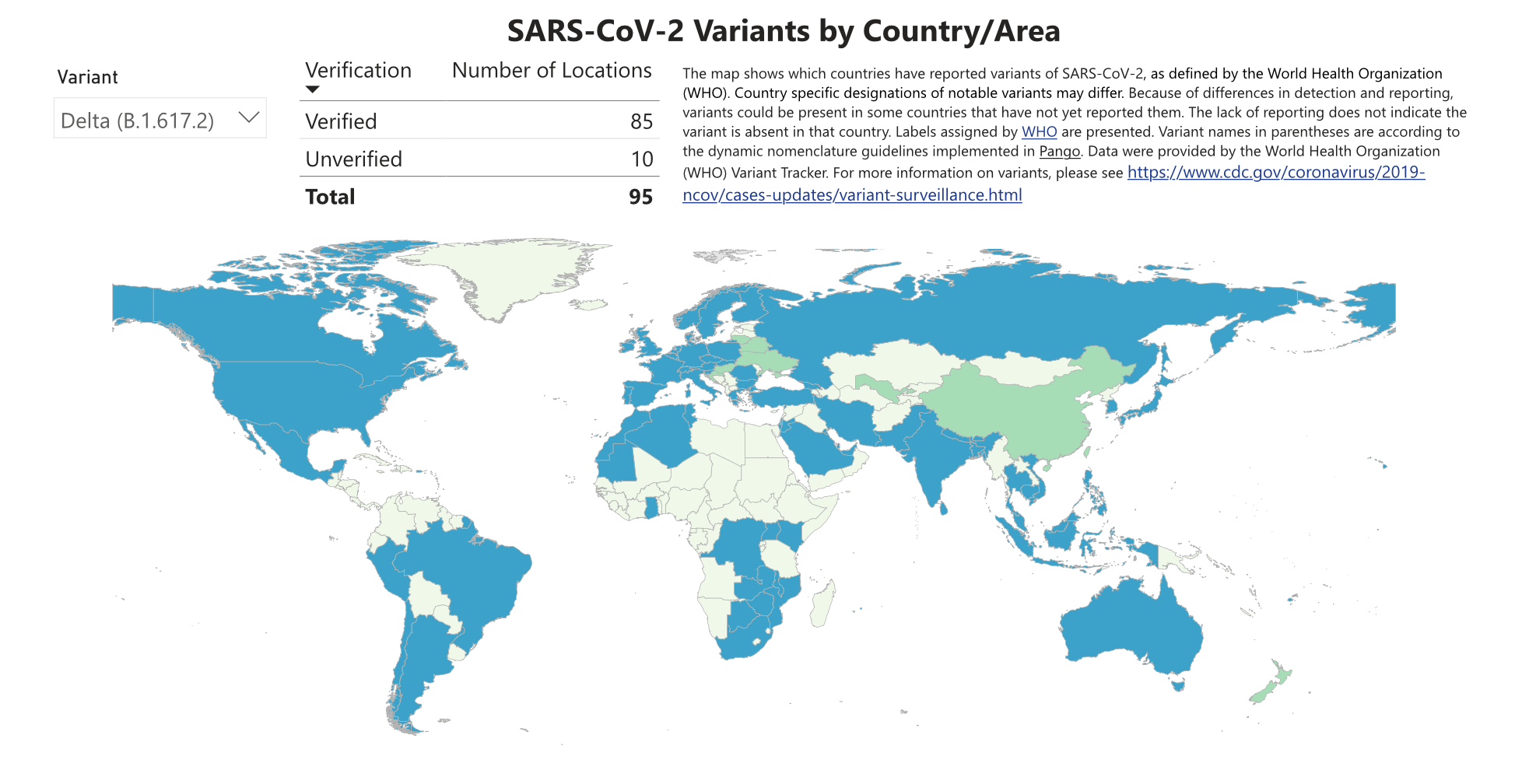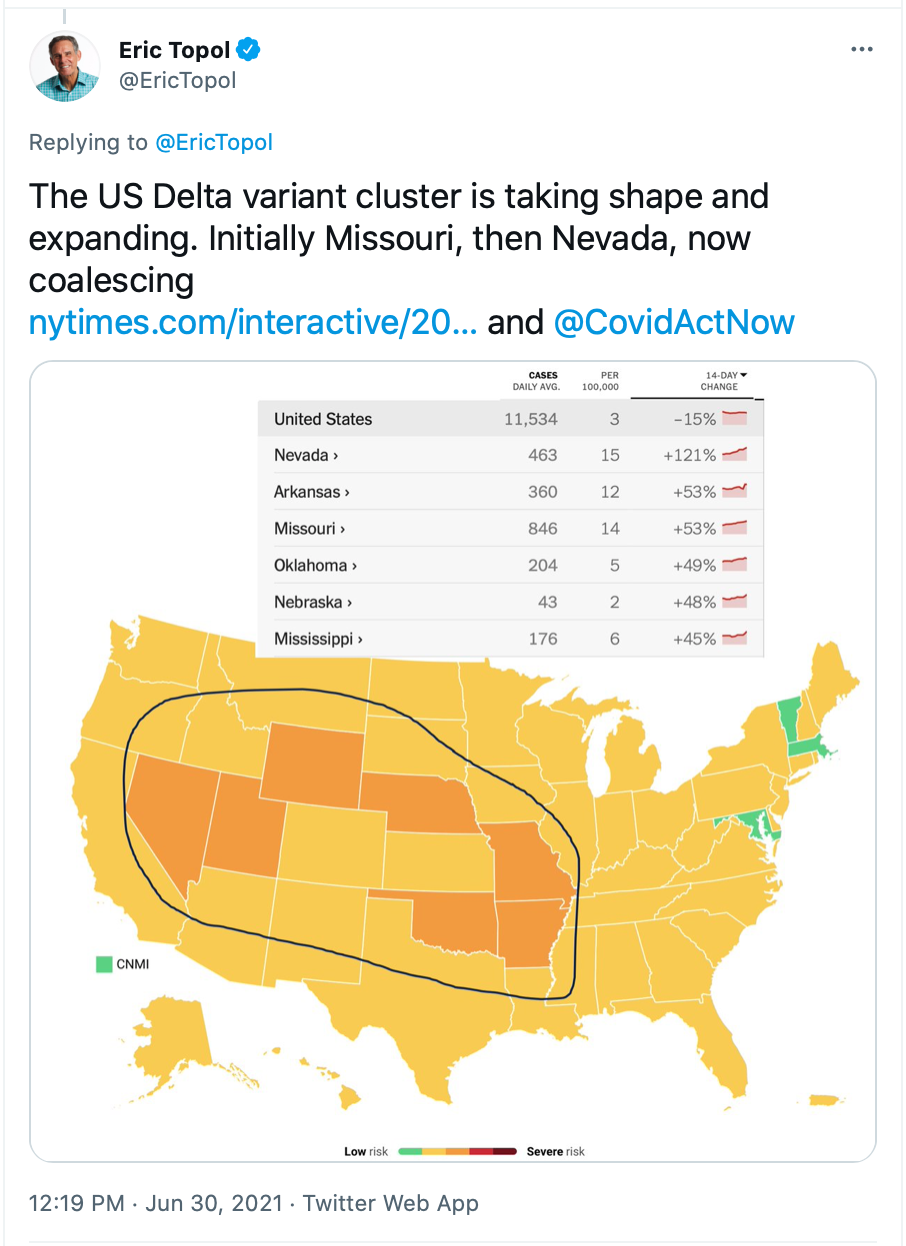Even in the early days of the COVID-19 outbreak, epidemiologists were preparing for the novel coronavirus to mutate in order to survive.
All viruses evolve as they infect hosts' cells and replicate. Most of those changes have little to no impact on viruses' properties, while other alterations in their genetic codes can change how viruses spread or attack hosts' immune systems.
It was the latter type of evolution of SARS-CoV-2, the virus that causes the COVID-19 respiratory disease, that sparked a wave of news stories in summer 2021.
In particular, some stories cited international public health leaders who said one strain of the coronavirus in particular — the so-called "delta variant" — was "the fastest and fittest" version of the virus yet. The articles, which highlighted the strain's contagiousness, raised questions over whether leaders in countries globally would enact new restrictions to try to curb new infections amid increasing COVID-19 vaccinations.
Below, we answer key questions about the delta variant, including whether existing COVID-19 vaccines have been shown to prevent its spread and what public health officials want you to know to stay healthy.
What Makes the Delta Variant Different from Other COVID Strains?
First discovered in India in October 2020, the delta variant (otherwise called "Delta (B.1.617.2)" in the medical world)) quickly spread to dozens of countries. It got its name from the World Health Organization (WHO), which labels notable virus strains after letters of the Greek alphabet.
According to the Centers for Disease Control and Prevention's (CDC) database, people in at least 85 countries have tested positive for that strain of the coronavirus.
Per that public health agency, the delta variant is a "variant of concern" along with three other mutations of the coronavirus.
But here's what's key: Experts say the strain spreads more easily than other versions of the coronavirus — including the alpha strain that was first detected in the United Kingdom — because of how its genetic code mutated to make it better at latching onto human cells.
According to studies cited by the Scientific American, a credible source of peer-reviewed research, the delta variant is 40 to 60% more transmissible than the alpha strain — which was already 50% more transmissible than the original SARS-CoV-2 virus that originated in Wuhan, China.
Speaking to the magazine, Eric Topol, a professor of molecular medicine and founder of the Scripps Research Institute, said: “It is the most hypertransmissible, contagious version of the virus we’ve seen to date, for sure — it’s a superspreader strain if there ever was one."
Additionally, there is some indication that the delta variant results in more severe illness compared to other versions of the coronavirus — but more research is needed on the matter.
One study in Scotland, published in The Lancet and cited by Scientific American, found the hospitalization rate of patients with the variant was about 85% higher than that of people with the alpha variant. But, as of this writing, there is not enough data to say whether or not delta is more deadly.
In other words, while the delta variant is indeed more contagious, it's not yet clear if, or to what extent, it affects people's immune systems differently than other strains.
Do Vaccinations Work Against the Variant?
Yes, studies show existing COVID-19 vaccines appear to prevent people from getting sick from delta, and fully vaccinated individuals (people who have received both doses in a two-dose inoculation series) are the most protected.
A preprint study by Public Health England found that two doses of the Pfizer-BioNTech vaccine and two doses of the AstraZeneca vaccine were 96 percent and 92 percent effective, respectively, at preventing hospitalization in people infected with Delta. That result is comparable to the level of protection seen against other variants. Meanwhile, a single dose of the AstraZeneca vaccine was only 71 percent effective against hospitalization caused by Delta (a single dose of Pfizer was still 94 percent effective), and one shot of either vaccine was only about 33.5 percent effective against symptomatic COVID from that variant, highlighting the importance of getting both doses.
In other words, researchers in England studied how effective the two-dose AstraZeneca and Pfizer-BioNTech vaccines (the brands most widely offered in Europe) were against the delta variation in comparison to other coronavirus strains, and nearly all participants in the study who were fully vaccinated did not get sick.
Additionally, Moderna executives said in a statement that its vaccine was found effective in preventing recipients from being infected by coronavirus variants, including the delta strain.
"These findings highlight the importance of continuing to vaccinate populations with an effective primary series vaccine," said Stéphane Bancel, chief executive officer of Moderna.
In sum, according to Topol's interview with the magazine, "you should not worry at all” about the Delta variant if you have had two doses of the Pfizer-BioNTech or Moderna vaccine and you have a relatively healthy immune system.
Less is known about how well the Johnson & Johnson vaccine protects against the variant (the CDC director said on June 30 that available evidence indicated that the J&J vaccine would likely "perform well against" delta), and immunocompromised people still need to be somewhat careful even if they are vaccinated, per Scientific American.
Where Is the Strain Expected To Spread?
The delta variant is expected to spread nearly everywhere across the globe — but especially in places where COVID-19 vaccination rates remain low, according to experts.
"It really is going to depend on a community-to-community basis,” Angela Rasmussen, a virologist at the Vaccine and Infectious Disease Organization–International Vaccine Center in Saskatchewan, told Scientific American. "We'll definitely see local surges."
Considering its transmissibility, the delta strain is on track to becoming the dominate variant of the coronavirus worldwide.
In the U.K., where health officials said the variant led to a surge in cases, the delta strain was responsible for about 90% of all new infections, as of late June.
Meanwhile, since American researchers first detected the variant in March, it had spread to the majority of states and accounted for about 26% of all new coronavirus cases, according to the CDC.
But let us put that trend into context.
The country's rate of new COVID-19 cases from day to day (no matter the strain) was trending downward over a period of months as more people got vaccinated. And with that trend, the number of people dying and seeking hospitalization due to the coronavirus was plummeting overall, too. (A June 29 analysis by The Associated Press found nearly all fatalities from COVID-19 were among people who were not vaccinated.)
Still, as new daily COVID-19 cases decreased overall, a greater share of patients tested positive for the delta variant.
(See above for information on how existing vaccine formulas by biotech companies Pfizer-BioNTech, AstraZeneca, Johnson & Johnson, and Moderna fight the variant.)
In short, epidemiologists worry the strain will wreak havoc in regions where swaths of the population remain unvaccinated. Anthony Fauci, the director of America’s National Institute of Allergy and Infectious Diseases, told CNN on June 29:
"Among undervaccinated regions — be that states, cities or counties — you're going to see these individual types of blips [of cases]," he said. "It's almost like it's going to be two Americas."
Meanwhile, as the variant drove new surges in countries in the Asia-Pacific region, officials there were reimposing restrictions and stay-at-home orders. Four Australian cites also reimposed lockdowns, and the Malaysian government said nationwide stay-at-home orders would be extended indefinitely, according to The New York Times.
Are Masks Encouraged for Fully-Vaccinated People?
The WHO is encouraging everyone globally to take the precaution of wearing a face mask, regardless of their vaccination status, while U.S. officials say fully-vaccinated individuals don't need to worry about facial coverings.
In an appearance on NBC's "TODAY" show on June 30, CDC Director Rochelle Walensky said the clashing recommendations was a result of the two agencies' scopes of work. Almost half of the U.S. population is fully vaccinated, compared with roughly 15% of the worldwide population, she said.
"We know that the WHO has to make guidelines and provide information to the world," Walensky said. "If you're vaccinated, you're safe from the variants that are circulating here in the United States." And that includes the delta variant.


